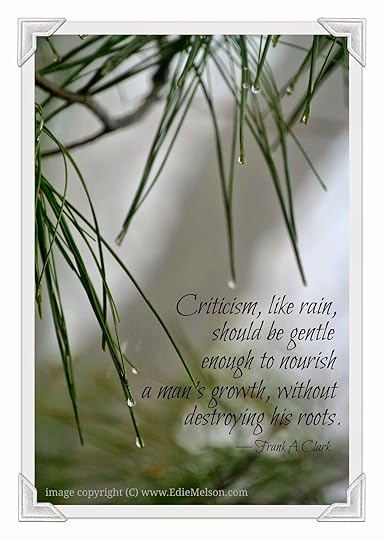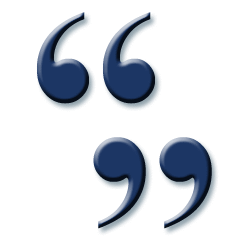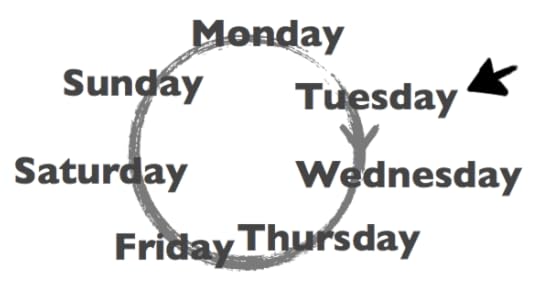Edie Melson's Blog, page 418
March 19, 2014
Dollars & Sense for Writers— Guidelines on Where & When to Spend Your Money—Part Two
by Edie Melson
 Yesterday I began this series on Dollars & Sense for Writers Part One. I gave you a run-down on where to start by suggesting you look for a local writers group and an online group or two. Today I’d like to continue by looking at books and magazines for writers.
Yesterday I began this series on Dollars & Sense for Writers Part One. I gave you a run-down on where to start by suggesting you look for a local writers group and an online group or two. Today I’d like to continue by looking at books and magazines for writers.
As a writer, I love books. Beyond that, I love books about writing. I have an extensive library of books on the craft of stringing words together—truthfully more than I need. But early on in my career I just couldn’t pass up a recommended book. Looking back I should have spent more time at the library than on buying books.
So how do you judge what to buy and what to borrow? Here are the questions I ask that help me determine which I truly need in my personal library.
 QuestionsIs this a book that I will refer back to again and again? Things that fall under this category are: Anything by James Scott Bell, TheEmotion Thesaurus, from Angela Ackerman & Becca Puglisi, The Book Buddy, from Susan May Warren, etc.
QuestionsIs this a book that I will refer back to again and again? Things that fall under this category are: Anything by James Scott Bell, TheEmotion Thesaurus, from Angela Ackerman & Becca Puglisi, The Book Buddy, from Susan May Warren, etc.
Is this a book that I’m tempted to highlight and make notes in? Even though it’s an ebook, Imagination @ Work, by Alton Gansky is one of those for me.
Has more than one person recommended this book?
When I’m in doubt, I check the book out of the library (or borrow it from a friend) to see if it meets any of these criteria.
Magazine Subscriptions I approach magazines with a slightly different mindset. For me, my subscription to Writer’s Digest is worth its weight in gold. Our own Lynn H Blackburn shared a post about What Makes Writer's Digest so Valuable. There’s just so much there. But I’ve migrated from the print subscription to the digital one because I’m overwhelmed with paper. I also have trouble throwing away old magazines.
I approach magazines with a slightly different mindset. For me, my subscription to Writer’s Digest is worth its weight in gold. Our own Lynn H Blackburn shared a post about What Makes Writer's Digest so Valuable. There’s just so much there. But I’ve migrated from the print subscription to the digital one because I’m overwhelmed with paper. I also have trouble throwing away old magazines.
There are other writing magazines I love, but I usually visit the book store and thumb through them before I buy a specific issue.
Once again, it’s time for you all to chime in. What books do think need to be in a writer’s library and what magazine subscriptions do you find valuable?
Don’t forget to join the conversation!Blessings,Edie
This series, Dollars & Sense for Writers will be continued on Wednesdays for the following posts.
TWEETABLESDollars & Sense for Writers - how to tell which books to buy and which to borrow - via @EdieMelson (Click to Tweet)
What writing books are must-haves for your writer's library? @EdieMelson shares how to decide (Click to Tweet)
 Yesterday I began this series on Dollars & Sense for Writers Part One. I gave you a run-down on where to start by suggesting you look for a local writers group and an online group or two. Today I’d like to continue by looking at books and magazines for writers.
Yesterday I began this series on Dollars & Sense for Writers Part One. I gave you a run-down on where to start by suggesting you look for a local writers group and an online group or two. Today I’d like to continue by looking at books and magazines for writers.As a writer, I love books. Beyond that, I love books about writing. I have an extensive library of books on the craft of stringing words together—truthfully more than I need. But early on in my career I just couldn’t pass up a recommended book. Looking back I should have spent more time at the library than on buying books.
So how do you judge what to buy and what to borrow? Here are the questions I ask that help me determine which I truly need in my personal library.
 QuestionsIs this a book that I will refer back to again and again? Things that fall under this category are: Anything by James Scott Bell, TheEmotion Thesaurus, from Angela Ackerman & Becca Puglisi, The Book Buddy, from Susan May Warren, etc.
QuestionsIs this a book that I will refer back to again and again? Things that fall under this category are: Anything by James Scott Bell, TheEmotion Thesaurus, from Angela Ackerman & Becca Puglisi, The Book Buddy, from Susan May Warren, etc.Is this a book that I’m tempted to highlight and make notes in? Even though it’s an ebook, Imagination @ Work, by Alton Gansky is one of those for me.
Has more than one person recommended this book?
When I’m in doubt, I check the book out of the library (or borrow it from a friend) to see if it meets any of these criteria.
Magazine Subscriptions
 I approach magazines with a slightly different mindset. For me, my subscription to Writer’s Digest is worth its weight in gold. Our own Lynn H Blackburn shared a post about What Makes Writer's Digest so Valuable. There’s just so much there. But I’ve migrated from the print subscription to the digital one because I’m overwhelmed with paper. I also have trouble throwing away old magazines.
I approach magazines with a slightly different mindset. For me, my subscription to Writer’s Digest is worth its weight in gold. Our own Lynn H Blackburn shared a post about What Makes Writer's Digest so Valuable. There’s just so much there. But I’ve migrated from the print subscription to the digital one because I’m overwhelmed with paper. I also have trouble throwing away old magazines. There are other writing magazines I love, but I usually visit the book store and thumb through them before I buy a specific issue.
Once again, it’s time for you all to chime in. What books do think need to be in a writer’s library and what magazine subscriptions do you find valuable?
Don’t forget to join the conversation!Blessings,Edie
This series, Dollars & Sense for Writers will be continued on Wednesdays for the following posts.
TWEETABLESDollars & Sense for Writers - how to tell which books to buy and which to borrow - via @EdieMelson (Click to Tweet)
What writing books are must-haves for your writer's library? @EdieMelson shares how to decide (Click to Tweet)
Published on March 19, 2014 01:00
March 18, 2014
Dollars & Sense for Writers—Guidelines on Where & When to Spend Your Money—Part One
by Edie Melson
 I remember what it was like when I was just starting out as a writer. I thought it was something I wanted to do. I even felt like it was something God called me to do. It’s an exciting time—a time when we’re trying on the moniker of writer.
I remember what it was like when I was just starting out as a writer. I thought it was something I wanted to do. I even felt like it was something God called me to do. It’s an exciting time—a time when we’re trying on the moniker of writer.
It’s also a time when we’re deciding exactly how big a commitment we’re going to make. We evaluate how much time we’ll spend an how much money we’ll invest. And it’s rarely an all-ahead-full sort of decision. I took it one step at a time. I would try something, evaluate the results and then readjust.
It was about the time of my first few forays into the writing world that I discovered this writing thing can get expensive . . . fast.
 There are books to buy, organizations to join, classes and workshops to take, even conferences to attend—all without a single bit of profit to support these investments. My budget was limited and I had to make some judgments about where to spend my money.
There are books to buy, organizations to join, classes and workshops to take, even conferences to attend—all without a single bit of profit to support these investments. My budget was limited and I had to make some judgments about where to spend my money.
Today, after many years in the business, I’d like to offer some guidelines on where and when to spend your money. It’s not always a straight-forward answer, but I’m going to try to cover most situations.
Which Organizations Should I join and Why I’d say one of the most valuable ways to learn about writing specifically and the publishing industry in general is by joining organizations. It’s important that you don’t just concentrate on learning to write, but you also need to know the process of publication so you can begin to earn money. Here is what I suggest.
I’d say one of the most valuable ways to learn about writing specifically and the publishing industry in general is by joining organizations. It’s important that you don’t just concentrate on learning to write, but you also need to know the process of publication so you can begin to earn money. Here is what I suggest.
1. Find a local group. Good places to look are local libraries and bookstores. They will often have a listing of any local writing groups. You can also do a search online. I know it’s not always possible to find a local group, but that’s where I always recommend you start.
2. Find an online group. There are many excellent national groups that have an online presence. I’m a member of several. Here are some I can recommend:
ACFW (American Christian Fiction Writers): is for Christian fiction writers. The membership is reasonable, starting at $50 per year. It also offers lots of benefits to members, including free online classes from publishing professionals, a national conference, and an email loop where you can ask writing related questions.My Book Therapy: This is another fiction group, specializing in Christian fiction. It’s a bit smaller and there is a free membership option. That’s good to give you a chance to try it out before you invest money.Word Weavers International: This is a great critique group option. They have local groups, as well as an online presence. This group was developed over years of experience in what works to help new and even more advanced writers. SCBWI (Society of Childrens Book Writers and Illustrators): This is specifically for those who write for children and young adults.ASJA (American Society of Journalists & Authors): This is specifically for the non-fiction writers.RWA (RomanceWriters of America): This is a national group for romance writers, and ACFW actual was formed from the membership of RWA.NWU (Nationa WritersUnion): I’m not a member of the national freelance writers group, but it’s a reputable group and I hear good things about it. NWA (NationalWriters Association): Again, I’m not a member, but this is another reputable group that I hear good things from. So which of these choices should you make? It depends, in a large part, on what you want to write and where you want your career to go. I recommend you start local, if possible, and look for recommendations.
So which of these choices should you make? It depends, in a large part, on what you want to write and where you want your career to go. I recommend you start local, if possible, and look for recommendations.
If you don’t have a local group, you can often find communities of writers through writing blogs. There are a large number of regular readers here on my site and they will be more than happy to give recommendations about this sort of thing.
I’m out of room for today’s post, but below are the topics I’ll be sharing in subsequent posts:
Which Books Should I Own and Which Should I Get at the Library—and What About Magazines, are They Still Relevant?How Do I Evaluate Which Classes I Need or Could Benefit FromConferences—When Am I Ready for One and Which One Should I chooseWebsite—When Should I Spend the Money? Now it’s your turn. What questions do you have about organizations and what other things would you like to see covered in this series? Be sure to leave your thoughts below.
Don’t forget to join the conversation!Blessings,
Edie
TWEETABLES
Dollars & Sense for Writers - tips on where & when to spend your money - New series from @EdieMelson (Click to Tweet)
How does a new writer know what's a good investment of time & money? Dollars & Sense from @EdieMelson (Click to Tweet)
 I remember what it was like when I was just starting out as a writer. I thought it was something I wanted to do. I even felt like it was something God called me to do. It’s an exciting time—a time when we’re trying on the moniker of writer.
I remember what it was like when I was just starting out as a writer. I thought it was something I wanted to do. I even felt like it was something God called me to do. It’s an exciting time—a time when we’re trying on the moniker of writer. It’s also a time when we’re deciding exactly how big a commitment we’re going to make. We evaluate how much time we’ll spend an how much money we’ll invest. And it’s rarely an all-ahead-full sort of decision. I took it one step at a time. I would try something, evaluate the results and then readjust.
It was about the time of my first few forays into the writing world that I discovered this writing thing can get expensive . . . fast.
 There are books to buy, organizations to join, classes and workshops to take, even conferences to attend—all without a single bit of profit to support these investments. My budget was limited and I had to make some judgments about where to spend my money.
There are books to buy, organizations to join, classes and workshops to take, even conferences to attend—all without a single bit of profit to support these investments. My budget was limited and I had to make some judgments about where to spend my money.Today, after many years in the business, I’d like to offer some guidelines on where and when to spend your money. It’s not always a straight-forward answer, but I’m going to try to cover most situations.
Which Organizations Should I join and Why
 I’d say one of the most valuable ways to learn about writing specifically and the publishing industry in general is by joining organizations. It’s important that you don’t just concentrate on learning to write, but you also need to know the process of publication so you can begin to earn money. Here is what I suggest.
I’d say one of the most valuable ways to learn about writing specifically and the publishing industry in general is by joining organizations. It’s important that you don’t just concentrate on learning to write, but you also need to know the process of publication so you can begin to earn money. Here is what I suggest.1. Find a local group. Good places to look are local libraries and bookstores. They will often have a listing of any local writing groups. You can also do a search online. I know it’s not always possible to find a local group, but that’s where I always recommend you start.
2. Find an online group. There are many excellent national groups that have an online presence. I’m a member of several. Here are some I can recommend:
ACFW (American Christian Fiction Writers): is for Christian fiction writers. The membership is reasonable, starting at $50 per year. It also offers lots of benefits to members, including free online classes from publishing professionals, a national conference, and an email loop where you can ask writing related questions.My Book Therapy: This is another fiction group, specializing in Christian fiction. It’s a bit smaller and there is a free membership option. That’s good to give you a chance to try it out before you invest money.Word Weavers International: This is a great critique group option. They have local groups, as well as an online presence. This group was developed over years of experience in what works to help new and even more advanced writers. SCBWI (Society of Childrens Book Writers and Illustrators): This is specifically for those who write for children and young adults.ASJA (American Society of Journalists & Authors): This is specifically for the non-fiction writers.RWA (RomanceWriters of America): This is a national group for romance writers, and ACFW actual was formed from the membership of RWA.NWU (Nationa WritersUnion): I’m not a member of the national freelance writers group, but it’s a reputable group and I hear good things about it. NWA (NationalWriters Association): Again, I’m not a member, but this is another reputable group that I hear good things from.
 So which of these choices should you make? It depends, in a large part, on what you want to write and where you want your career to go. I recommend you start local, if possible, and look for recommendations.
So which of these choices should you make? It depends, in a large part, on what you want to write and where you want your career to go. I recommend you start local, if possible, and look for recommendations. If you don’t have a local group, you can often find communities of writers through writing blogs. There are a large number of regular readers here on my site and they will be more than happy to give recommendations about this sort of thing.
I’m out of room for today’s post, but below are the topics I’ll be sharing in subsequent posts:
Which Books Should I Own and Which Should I Get at the Library—and What About Magazines, are They Still Relevant?How Do I Evaluate Which Classes I Need or Could Benefit FromConferences—When Am I Ready for One and Which One Should I chooseWebsite—When Should I Spend the Money? Now it’s your turn. What questions do you have about organizations and what other things would you like to see covered in this series? Be sure to leave your thoughts below.
Don’t forget to join the conversation!Blessings,
Edie
TWEETABLES
Dollars & Sense for Writers - tips on where & when to spend your money - New series from @EdieMelson (Click to Tweet)
How does a new writer know what's a good investment of time & money? Dollars & Sense from @EdieMelson (Click to Tweet)
Published on March 18, 2014 01:00
March 17, 2014
Social Media Monday—7 Tips to Get More Comments on Your Blog
by Edie Melson
 Even today—with as many blogs on the Internet as there are—blogging is still a valuable part of building and maintaining an online community. But it’s rare for a blog to take hold and grow, if it’s not a place where comments proliferate. Almost no one likes to be lectured, and that’s what a blog can feel with it the conversation is only one-sided.
Even today—with as many blogs on the Internet as there are—blogging is still a valuable part of building and maintaining an online community. But it’s rare for a blog to take hold and grow, if it’s not a place where comments proliferate. Almost no one likes to be lectured, and that’s what a blog can feel with it the conversation is only one-sided.
I’ll go one step further and add this comparison. Your blog is your Internet home. And because it’s your home, you are responsible for being a good host and making people feel welcome.
Facilitating conversation is just one of the duties of a good host, but it’s the one I want to concentrate on today as I share tips to get more comments on your blog.1. Give your readers someone to relate to. This means making sure they know who wrote the blog post. Ideally your blog post should have a byline—like my name at the top of this post. But at the least, end with your name. (A byline also helps with your name recognition on search engines, but that's a post for another time.) It's very hard to join a conversation when you don't know who you're talking to.
 2. Keep your post focused and don’t wander too far away from your topic. If you try to cover too much area, people won’t be comfortable commenting.
2. Keep your post focused and don’t wander too far away from your topic. If you try to cover too much area, people won’t be comfortable commenting.
3. Make sure your post isn’t too long. If you take up too much of your audience’s time, they won’t be able to stay and chat.
4. Watch your blog formatting. Even with interesting posts, people will still do some skimming. If you have headers, bullet points and/or lists they can still join the conversation.
 5. Always (yes, ALWAYS) end your post with an open ended question. People don’t always know what’s appropriate to share. By asking a question, you give them the direction they need to chime in. Remember, as a host, it’s your job not to just facilitate the conversation, but you’re responsible for starting it.
5. Always (yes, ALWAYS) end your post with an open ended question. People don’t always know what’s appropriate to share. By asking a question, you give them the direction they need to chime in. Remember, as a host, it’s your job not to just facilitate the conversation, but you’re responsible for starting it.
6. Don’t ignore your guests. If people are kind enough to comment, you need to return the favor and continue the conversation. There are exceptions, if you have more than 20 comments, or if they are very similar, it’s find to answer a couple of people at a time.
7. Remind your guests to leave a comment below. Don’t apologize by saying, "if you feel comfortable" or "if you want." Just tell them what you’d like them to do. Sometimes that’s just what someone need to be able to work up the courage to join in.
These are the things I’ve found that encourage readers to take part in the discussion and make my blog feel like a community. What are some things that help you feel comfortable enough to take part in the conversation? Be sure to leave your thoughts below.
Don’t forget to join this conversation!Blessings,
Edie
TWEETABLESWant to get more comments on your blog posts? Social Media Mentor @EdieMelson has the tips for you! (Click to Tweet)
Not getting comments on your blog posts? These tips from Social Media Mentor @EdieMelson can help! (Click to Tweet)
 Even today—with as many blogs on the Internet as there are—blogging is still a valuable part of building and maintaining an online community. But it’s rare for a blog to take hold and grow, if it’s not a place where comments proliferate. Almost no one likes to be lectured, and that’s what a blog can feel with it the conversation is only one-sided.
Even today—with as many blogs on the Internet as there are—blogging is still a valuable part of building and maintaining an online community. But it’s rare for a blog to take hold and grow, if it’s not a place where comments proliferate. Almost no one likes to be lectured, and that’s what a blog can feel with it the conversation is only one-sided. I’ll go one step further and add this comparison. Your blog is your Internet home. And because it’s your home, you are responsible for being a good host and making people feel welcome.
Facilitating conversation is just one of the duties of a good host, but it’s the one I want to concentrate on today as I share tips to get more comments on your blog.1. Give your readers someone to relate to. This means making sure they know who wrote the blog post. Ideally your blog post should have a byline—like my name at the top of this post. But at the least, end with your name. (A byline also helps with your name recognition on search engines, but that's a post for another time.) It's very hard to join a conversation when you don't know who you're talking to.
 2. Keep your post focused and don’t wander too far away from your topic. If you try to cover too much area, people won’t be comfortable commenting.
2. Keep your post focused and don’t wander too far away from your topic. If you try to cover too much area, people won’t be comfortable commenting.3. Make sure your post isn’t too long. If you take up too much of your audience’s time, they won’t be able to stay and chat.
4. Watch your blog formatting. Even with interesting posts, people will still do some skimming. If you have headers, bullet points and/or lists they can still join the conversation.
 5. Always (yes, ALWAYS) end your post with an open ended question. People don’t always know what’s appropriate to share. By asking a question, you give them the direction they need to chime in. Remember, as a host, it’s your job not to just facilitate the conversation, but you’re responsible for starting it.
5. Always (yes, ALWAYS) end your post with an open ended question. People don’t always know what’s appropriate to share. By asking a question, you give them the direction they need to chime in. Remember, as a host, it’s your job not to just facilitate the conversation, but you’re responsible for starting it.6. Don’t ignore your guests. If people are kind enough to comment, you need to return the favor and continue the conversation. There are exceptions, if you have more than 20 comments, or if they are very similar, it’s find to answer a couple of people at a time.
7. Remind your guests to leave a comment below. Don’t apologize by saying, "if you feel comfortable" or "if you want." Just tell them what you’d like them to do. Sometimes that’s just what someone need to be able to work up the courage to join in.
These are the things I’ve found that encourage readers to take part in the discussion and make my blog feel like a community. What are some things that help you feel comfortable enough to take part in the conversation? Be sure to leave your thoughts below.
Don’t forget to join this conversation!Blessings,
Edie
TWEETABLESWant to get more comments on your blog posts? Social Media Mentor @EdieMelson has the tips for you! (Click to Tweet)
Not getting comments on your blog posts? These tips from Social Media Mentor @EdieMelson can help! (Click to Tweet)
Published on March 17, 2014 01:00
March 16, 2014
Weekend Worship—Don’t Get Caught in The Comparison Trap
. . . He says, “Don’t be afraid, because I have saved you. I have called you by name, and you are mine.” Isaiah 43:1
 Image credit: iqoncept / 123RF Stock PhotoI just finished a wonderful weekend at the Carolina Christian Writers Conference. But there was something I noticed while I was there. We writers are way too hard on ourselves. We’re constantly comparing ourselves to each other. No mater where we are in our career, we’re always looking at the person ahead of us.
Image credit: iqoncept / 123RF Stock PhotoI just finished a wonderful weekend at the Carolina Christian Writers Conference. But there was something I noticed while I was there. We writers are way too hard on ourselves. We’re constantly comparing ourselves to each other. No mater where we are in our career, we’re always looking at the person ahead of us.
We need to quit looking ahead and start looking up.
It’s easy to get caught up in the comparison mentality. There’s so much about our industry that depends on the opinions of others. We check to see how many views our articles get, how many followers our blogs have, and/or how many stars the reviewer gave our latest book.
 These things can undermine and sometimes even totally destroy our perspective, not to mention our confidence. Because, let’s face it, there is always someone willing to point out what we did wrong or could have done better.
These things can undermine and sometimes even totally destroy our perspective, not to mention our confidence. Because, let’s face it, there is always someone willing to point out what we did wrong or could have done better.
If we’re not careful, we can get to the point where we value what others are saying aboutus more than what God is doing through us.
So how do we stay focused in this crazy writing world where everyone seems altogether too eager to pass judgment? I think the key to thriving in this hyper-competitive environment is to keep focused on what and especially on WHO truly matters. And remember that HE knows my name. God doesn’t just recognize my face, He knows my character.
I’ve found that only when I focus God’s word and His opinion, my heart stays safe and protected. That’s when I’m insulated from a worldly perspective determined to destroy anything God has called good.
 Image credit: iqoncept / 123RF Stock PhotoI just finished a wonderful weekend at the Carolina Christian Writers Conference. But there was something I noticed while I was there. We writers are way too hard on ourselves. We’re constantly comparing ourselves to each other. No mater where we are in our career, we’re always looking at the person ahead of us.
Image credit: iqoncept / 123RF Stock PhotoI just finished a wonderful weekend at the Carolina Christian Writers Conference. But there was something I noticed while I was there. We writers are way too hard on ourselves. We’re constantly comparing ourselves to each other. No mater where we are in our career, we’re always looking at the person ahead of us.We need to quit looking ahead and start looking up.
It’s easy to get caught up in the comparison mentality. There’s so much about our industry that depends on the opinions of others. We check to see how many views our articles get, how many followers our blogs have, and/or how many stars the reviewer gave our latest book.
 These things can undermine and sometimes even totally destroy our perspective, not to mention our confidence. Because, let’s face it, there is always someone willing to point out what we did wrong or could have done better.
These things can undermine and sometimes even totally destroy our perspective, not to mention our confidence. Because, let’s face it, there is always someone willing to point out what we did wrong or could have done better. If we’re not careful, we can get to the point where we value what others are saying aboutus more than what God is doing through us.
So how do we stay focused in this crazy writing world where everyone seems altogether too eager to pass judgment? I think the key to thriving in this hyper-competitive environment is to keep focused on what and especially on WHO truly matters. And remember that HE knows my name. God doesn’t just recognize my face, He knows my character.
I’ve found that only when I focus God’s word and His opinion, my heart stays safe and protected. That’s when I’m insulated from a worldly perspective determined to destroy anything God has called good.
Published on March 16, 2014 01:00
March 15, 2014
Social Media Image—Criticism
We've all had our fair share of criticism. How do you handle it when it's harsh and undeserved?
 Criticism, like rain, should be gentle enough to nourish a man's growth,
Criticism, like rain, should be gentle enough to nourish a man's growth,
without destroying his roots. - Frank A. ClarkShare your thoughts in the comment section below.
I also invite you to use this image any way you like online. Post it to your blog, share it on Facebook, Twitter, Pinterest, anywhere you'd like. All I ask is that you keep it intact, with my website watermark visible.
Don't forget to join the conversation!Blessings,Edie
 Criticism, like rain, should be gentle enough to nourish a man's growth,
Criticism, like rain, should be gentle enough to nourish a man's growth, without destroying his roots. - Frank A. ClarkShare your thoughts in the comment section below.
I also invite you to use this image any way you like online. Post it to your blog, share it on Facebook, Twitter, Pinterest, anywhere you'd like. All I ask is that you keep it intact, with my website watermark visible.
Don't forget to join the conversation!Blessings,Edie
Published on March 15, 2014 01:00
March 14, 2014
You Know You’re Editor Material When . . .
by Edie Melson
 I LOVE editing!I love editing.
I LOVE editing!I love editing.
To me, it’s the process of bringing order to chaos. It’s not just my own words that I want to make sing, it’s the words of others. I get as much joy when an author I edited succeeds as when I do.
I’ve discovered this isn’t a universal gift. Some would even argue that it's a curse. But you know you’re editor material when . . .1. Grammar jokes never fail to crack you up—because they’re funny, right?
 The misuse of quotations marks drives you nuts.2. The misuse of quotation marks sends you into a five minute tirade.
The misuse of quotations marks drives you nuts.2. The misuse of quotation marks sends you into a five minute tirade.
3. You mark the mistakes you find—in red pen—in the books you read.
4. You listen to grammar podcasts. After all, those tips and tricks come in handy, right?
5. You could talk for hours about comma usage.
6. You’re constantly clarifying what someone says, because in general, people should be more precise.
 You can't resist marking typos.7. When you receive handouts in a meeting or workshop, you find yourself marking typos and rewording sentences to tighten it up.
You can't resist marking typos.7. When you receive handouts in a meeting or workshop, you find yourself marking typos and rewording sentences to tighten it up.
8. You collect pictures of grammar mistakes.
9. Your critique group has nick-named you the Grammar Snob.
10. You know how to use the edit feature on Facebook.
Now it's your turn to add to the list. Be sure to leave your comments in the section below.
Don't forget to join the conversation!Blessings,Edie
TWEETABLESDo you have the heart & soul of an editor? Not sure - @EdieMelson has some clues that may help. (Click to Tweet)
You know you're editor material when.... A fun post from @EdieMelson (Click to Tweet)
 I LOVE editing!I love editing.
I LOVE editing!I love editing.To me, it’s the process of bringing order to chaos. It’s not just my own words that I want to make sing, it’s the words of others. I get as much joy when an author I edited succeeds as when I do.
I’ve discovered this isn’t a universal gift. Some would even argue that it's a curse. But you know you’re editor material when . . .1. Grammar jokes never fail to crack you up—because they’re funny, right?
 The misuse of quotations marks drives you nuts.2. The misuse of quotation marks sends you into a five minute tirade.
The misuse of quotations marks drives you nuts.2. The misuse of quotation marks sends you into a five minute tirade.3. You mark the mistakes you find—in red pen—in the books you read.
4. You listen to grammar podcasts. After all, those tips and tricks come in handy, right?
5. You could talk for hours about comma usage.
6. You’re constantly clarifying what someone says, because in general, people should be more precise.
 You can't resist marking typos.7. When you receive handouts in a meeting or workshop, you find yourself marking typos and rewording sentences to tighten it up.
You can't resist marking typos.7. When you receive handouts in a meeting or workshop, you find yourself marking typos and rewording sentences to tighten it up.8. You collect pictures of grammar mistakes.
9. Your critique group has nick-named you the Grammar Snob.
10. You know how to use the edit feature on Facebook.
Now it's your turn to add to the list. Be sure to leave your comments in the section below.
Don't forget to join the conversation!Blessings,Edie
TWEETABLESDo you have the heart & soul of an editor? Not sure - @EdieMelson has some clues that may help. (Click to Tweet)
You know you're editor material when.... A fun post from @EdieMelson (Click to Tweet)
Published on March 14, 2014 01:00
March 12, 2014
Writing Through the Chaos—Tips to Keep Moving Forward When Life Happens
by Edie Melson
 Life happens to all of us, and with it comes times of chaos and catastrophe. It’s easy to get derailed and let our writing life come to a screeching halt. That’s never a good thing, no matter what crisis we’re dealing with—from the death of a loved one, to an unexpected winter storm. Because as writers, we process life by putting words on paper (or screen). Suddenly finding ourselves with no time or energy to write can be as traumatic as the original event.
Life happens to all of us, and with it comes times of chaos and catastrophe. It’s easy to get derailed and let our writing life come to a screeching halt. That’s never a good thing, no matter what crisis we’re dealing with—from the death of a loved one, to an unexpected winter storm. Because as writers, we process life by putting words on paper (or screen). Suddenly finding ourselves with no time or energy to write can be as traumatic as the original event.
We need that exercise to keep us sane. The things we write may change, depending on the circumstance where we find ourselves, but I propose that we will cope better by setting aside time. Today I want to share some tips to keep moving forward when life happens.
In case you think I’m dealing with concepts instead of reality you should know that I’m actually writing this blog post from a place of chaos. It’s been a tumultuous couple of weeks around my house. My father suffered a stroke while I was out of town teaching at a conference (he’s continuing to improve), I found myself bedridden with a nasty sinus/ear infection, and our daughter-in-law lost her father. On top of that, my Guideposts military blog, While They Serve, launched right smack dab in the middle of all this.
Trust me, I know what I’m talking about here. This is how I’ve survived many upheavals in my life.
Prioritize, prioritize, prioritize: During times like these, a calendar is your best friend. Sit down and look at all you have on your writing plate. Start with the things you’re getting paid for and/or you consider legitimate work. Those need to have top priority.Next look at things you’ve made a commitment to do. These could be anything from blogging on your own site to blogging on other sites or other types of writing. The thing you want to do with this group is look and see what you can reschedule, back out of, postpone, or ask someone else to do.Finally look at the things you wanted to accomplish. This might include things like get a piece ready for a contest or submission or just making forward progress on your current WIP (Work In Progress).Now, before you set down the calendar, look at the commitments generated by the chaos. These could include doctor visits, time at the hospital, time without electricity, anything out of the ordinary.
Start with the things you’re getting paid for and/or you consider legitimate work. Those need to have top priority.Next look at things you’ve made a commitment to do. These could be anything from blogging on your own site to blogging on other sites or other types of writing. The thing you want to do with this group is look and see what you can reschedule, back out of, postpone, or ask someone else to do.Finally look at the things you wanted to accomplish. This might include things like get a piece ready for a contest or submission or just making forward progress on your current WIP (Work In Progress).Now, before you set down the calendar, look at the commitments generated by the chaos. These could include doctor visits, time at the hospital, time without electricity, anything out of the ordinary.
 Begin fitting projects into the spaces around your commitments. I know this doesn’t always seem possible, but you can get significant progress in 20 – 30 bites of time. Here are some tips to write inthe bits and pieces of time you've got.
Begin fitting projects into the spaces around your commitments. I know this doesn’t always seem possible, but you can get significant progress in 20 – 30 bites of time. Here are some tips to write inthe bits and pieces of time you've got.
For example, one thing I must do is schedule social media every morning. It’s part of my job at My Book Therapy. I would get to the hospital in the morning. Spend some time visiting with my mom and dad, then announce I had 30 minutes of work to do. Assuming a doctor didn’t come in, I kept my head down and worked for that space of time. Afterwards, I closed my laptop and again was available to visit, help, etc. I also took several breaks during the day to answer comments on my new Guideposts blog, as well as my own.
We all know this isn’t the ideal to write, but you have to use the time you can carve out.
Additional TipsContact those places where you have commitments. People will forgive a lot if they know what’s going on. This is the time to be an EXCELLENT communicator. Call in favors, and enlist guest bloggers where you can for your own site.Don’t forget you can recycle old posts to save creative energy for paid writing assignments.Cut back on the number of social media updates you put out daily and/or eliminate them altogether. But don’t be afraid to use social media to ask for prayer support. Your readers and audience will feel more connected to you by sharing this part of your life.Try to carve out time to work on something you want to do. It may be a blog post, a WIP, a devotion or even a poem. But if you feel that creative hunger, feed it. You’ll be calmer and more able to cope if you do.Don’t waste what’s happening, instead incorporate it into your writing. If you have a blog, do what I’m doing and share your process in a post. At the very least, find a place to write out your feelings and journal what’s happening. If you can’t use it immediately, I guarantee it will come back when you need it. Just don’t lose it by not recording it.Try your hand a writing a devotion. If life is in chaos, I guarantee you’re learning some tough lessons. You may not end up with a finished product, but jot down the details of what you’re learning.Write a poem. Yes, you read that right. It doesn’t have to rhyme, but it can. And it doesn’t even have to be good. But searching for the words to describe intense feelings is a good way to process and come to grips with a life that seems out of control. If a full poem seems too intimidating, consider a haiku. Here’s a link to help you Write a Haiku. Use this time to accomplish small tasks. Here are just a few to get you started:
Call in favors, and enlist guest bloggers where you can for your own site.Don’t forget you can recycle old posts to save creative energy for paid writing assignments.Cut back on the number of social media updates you put out daily and/or eliminate them altogether. But don’t be afraid to use social media to ask for prayer support. Your readers and audience will feel more connected to you by sharing this part of your life.Try to carve out time to work on something you want to do. It may be a blog post, a WIP, a devotion or even a poem. But if you feel that creative hunger, feed it. You’ll be calmer and more able to cope if you do.Don’t waste what’s happening, instead incorporate it into your writing. If you have a blog, do what I’m doing and share your process in a post. At the very least, find a place to write out your feelings and journal what’s happening. If you can’t use it immediately, I guarantee it will come back when you need it. Just don’t lose it by not recording it.Try your hand a writing a devotion. If life is in chaos, I guarantee you’re learning some tough lessons. You may not end up with a finished product, but jot down the details of what you’re learning.Write a poem. Yes, you read that right. It doesn’t have to rhyme, but it can. And it doesn’t even have to be good. But searching for the words to describe intense feelings is a good way to process and come to grips with a life that seems out of control. If a full poem seems too intimidating, consider a haiku. Here’s a link to help you Write a Haiku. Use this time to accomplish small tasks. Here are just a few to get you started:
Write a character sketch.Research a setting or job descriptionCheck your timeline.Edit a chapter.Make a list of possible blog posts.Pick an emotion and brainstorm ways to show it rather than name it.We all have times that could potentially stop all forward momentum in our writing lives. But it doesn’t have to. And when you’ve weathered the storm, you’ll be glad you kept moving.
I’d love to know what you do to stay on track with writing when chaos happens. Be sure to share your thoughts below.
Don’t forget to join the conversation!Blessings,
Edie
TWEETABLES
Writing through the chaos - tips from @EdieMelson to keep moving forward when life happens. (Click to Tweet)
Are you facing chaos and/or calamity? @EdieMelson has tips to help keep your writing on track. (Click to Tweet)
 Life happens to all of us, and with it comes times of chaos and catastrophe. It’s easy to get derailed and let our writing life come to a screeching halt. That’s never a good thing, no matter what crisis we’re dealing with—from the death of a loved one, to an unexpected winter storm. Because as writers, we process life by putting words on paper (or screen). Suddenly finding ourselves with no time or energy to write can be as traumatic as the original event.
Life happens to all of us, and with it comes times of chaos and catastrophe. It’s easy to get derailed and let our writing life come to a screeching halt. That’s never a good thing, no matter what crisis we’re dealing with—from the death of a loved one, to an unexpected winter storm. Because as writers, we process life by putting words on paper (or screen). Suddenly finding ourselves with no time or energy to write can be as traumatic as the original event. We need that exercise to keep us sane. The things we write may change, depending on the circumstance where we find ourselves, but I propose that we will cope better by setting aside time. Today I want to share some tips to keep moving forward when life happens.
In case you think I’m dealing with concepts instead of reality you should know that I’m actually writing this blog post from a place of chaos. It’s been a tumultuous couple of weeks around my house. My father suffered a stroke while I was out of town teaching at a conference (he’s continuing to improve), I found myself bedridden with a nasty sinus/ear infection, and our daughter-in-law lost her father. On top of that, my Guideposts military blog, While They Serve, launched right smack dab in the middle of all this.
Trust me, I know what I’m talking about here. This is how I’ve survived many upheavals in my life.
Prioritize, prioritize, prioritize: During times like these, a calendar is your best friend. Sit down and look at all you have on your writing plate.
 Start with the things you’re getting paid for and/or you consider legitimate work. Those need to have top priority.Next look at things you’ve made a commitment to do. These could be anything from blogging on your own site to blogging on other sites or other types of writing. The thing you want to do with this group is look and see what you can reschedule, back out of, postpone, or ask someone else to do.Finally look at the things you wanted to accomplish. This might include things like get a piece ready for a contest or submission or just making forward progress on your current WIP (Work In Progress).Now, before you set down the calendar, look at the commitments generated by the chaos. These could include doctor visits, time at the hospital, time without electricity, anything out of the ordinary.
Start with the things you’re getting paid for and/or you consider legitimate work. Those need to have top priority.Next look at things you’ve made a commitment to do. These could be anything from blogging on your own site to blogging on other sites or other types of writing. The thing you want to do with this group is look and see what you can reschedule, back out of, postpone, or ask someone else to do.Finally look at the things you wanted to accomplish. This might include things like get a piece ready for a contest or submission or just making forward progress on your current WIP (Work In Progress).Now, before you set down the calendar, look at the commitments generated by the chaos. These could include doctor visits, time at the hospital, time without electricity, anything out of the ordinary.  Begin fitting projects into the spaces around your commitments. I know this doesn’t always seem possible, but you can get significant progress in 20 – 30 bites of time. Here are some tips to write inthe bits and pieces of time you've got.
Begin fitting projects into the spaces around your commitments. I know this doesn’t always seem possible, but you can get significant progress in 20 – 30 bites of time. Here are some tips to write inthe bits and pieces of time you've got. For example, one thing I must do is schedule social media every morning. It’s part of my job at My Book Therapy. I would get to the hospital in the morning. Spend some time visiting with my mom and dad, then announce I had 30 minutes of work to do. Assuming a doctor didn’t come in, I kept my head down and worked for that space of time. Afterwards, I closed my laptop and again was available to visit, help, etc. I also took several breaks during the day to answer comments on my new Guideposts blog, as well as my own.
We all know this isn’t the ideal to write, but you have to use the time you can carve out.
Additional TipsContact those places where you have commitments. People will forgive a lot if they know what’s going on. This is the time to be an EXCELLENT communicator.
 Call in favors, and enlist guest bloggers where you can for your own site.Don’t forget you can recycle old posts to save creative energy for paid writing assignments.Cut back on the number of social media updates you put out daily and/or eliminate them altogether. But don’t be afraid to use social media to ask for prayer support. Your readers and audience will feel more connected to you by sharing this part of your life.Try to carve out time to work on something you want to do. It may be a blog post, a WIP, a devotion or even a poem. But if you feel that creative hunger, feed it. You’ll be calmer and more able to cope if you do.Don’t waste what’s happening, instead incorporate it into your writing. If you have a blog, do what I’m doing and share your process in a post. At the very least, find a place to write out your feelings and journal what’s happening. If you can’t use it immediately, I guarantee it will come back when you need it. Just don’t lose it by not recording it.Try your hand a writing a devotion. If life is in chaos, I guarantee you’re learning some tough lessons. You may not end up with a finished product, but jot down the details of what you’re learning.Write a poem. Yes, you read that right. It doesn’t have to rhyme, but it can. And it doesn’t even have to be good. But searching for the words to describe intense feelings is a good way to process and come to grips with a life that seems out of control. If a full poem seems too intimidating, consider a haiku. Here’s a link to help you Write a Haiku. Use this time to accomplish small tasks. Here are just a few to get you started:
Call in favors, and enlist guest bloggers where you can for your own site.Don’t forget you can recycle old posts to save creative energy for paid writing assignments.Cut back on the number of social media updates you put out daily and/or eliminate them altogether. But don’t be afraid to use social media to ask for prayer support. Your readers and audience will feel more connected to you by sharing this part of your life.Try to carve out time to work on something you want to do. It may be a blog post, a WIP, a devotion or even a poem. But if you feel that creative hunger, feed it. You’ll be calmer and more able to cope if you do.Don’t waste what’s happening, instead incorporate it into your writing. If you have a blog, do what I’m doing and share your process in a post. At the very least, find a place to write out your feelings and journal what’s happening. If you can’t use it immediately, I guarantee it will come back when you need it. Just don’t lose it by not recording it.Try your hand a writing a devotion. If life is in chaos, I guarantee you’re learning some tough lessons. You may not end up with a finished product, but jot down the details of what you’re learning.Write a poem. Yes, you read that right. It doesn’t have to rhyme, but it can. And it doesn’t even have to be good. But searching for the words to describe intense feelings is a good way to process and come to grips with a life that seems out of control. If a full poem seems too intimidating, consider a haiku. Here’s a link to help you Write a Haiku. Use this time to accomplish small tasks. Here are just a few to get you started:Write a character sketch.Research a setting or job descriptionCheck your timeline.Edit a chapter.Make a list of possible blog posts.Pick an emotion and brainstorm ways to show it rather than name it.We all have times that could potentially stop all forward momentum in our writing lives. But it doesn’t have to. And when you’ve weathered the storm, you’ll be glad you kept moving.
I’d love to know what you do to stay on track with writing when chaos happens. Be sure to share your thoughts below.
Don’t forget to join the conversation!Blessings,
Edie
TWEETABLES
Writing through the chaos - tips from @EdieMelson to keep moving forward when life happens. (Click to Tweet)
Are you facing chaos and/or calamity? @EdieMelson has tips to help keep your writing on track. (Click to Tweet)
Published on March 12, 2014 00:59
March 11, 2014
My Top 10 Favorite Writing Quotes
by Edie Melson
 I love quotes about writing.I love quotes about writing. So today I thought I’d share my top 10 favorite writing quotes with you.
I love quotes about writing.I love quotes about writing. So today I thought I’d share my top 10 favorite writing quotes with you.
10. It is perfectly okay to write garbage—as long as you edit brilliantly. - C. J. Cherryh
9. It’s none of their business that you have to learn to write. Let them think you were born that way. - Ernest Hemingway
8. I try to create sympathy for my characters, then turn the monsters loose. - Stephen King
 Prose is architecture...7. Prose is architecture, not interior decoration.
- Ernest Hemingway
Prose is architecture...7. Prose is architecture, not interior decoration.
- Ernest Hemingway
6. I love deadlines. I like the whooshing sound they make as they fly by. - Douglas Adams
5. Poetry creates the myth, the prose writer draws its portrait. - Jean-Paul Sartre
4. Easy reading is damn hard writing. - Nathaniel Hawthorne
3. The road to hell is paved with adverbs.- Stephen King
2. We are all apprentices in a craft where no one ever becomes a master. - Ernest Hemingway
1. I write for the same reason I breathe—because if I didn't, I would die. - Isaac Asimov
Now it’s your turn. I’d love for you to share some of your favorite quotes. Be sure to leave them in the comments section below.
Don’t forget to join the conversation!Blessings,Edie
 I love quotes about writing.I love quotes about writing. So today I thought I’d share my top 10 favorite writing quotes with you.
I love quotes about writing.I love quotes about writing. So today I thought I’d share my top 10 favorite writing quotes with you. 10. It is perfectly okay to write garbage—as long as you edit brilliantly. - C. J. Cherryh
9. It’s none of their business that you have to learn to write. Let them think you were born that way. - Ernest Hemingway
8. I try to create sympathy for my characters, then turn the monsters loose. - Stephen King
 Prose is architecture...7. Prose is architecture, not interior decoration.
- Ernest Hemingway
Prose is architecture...7. Prose is architecture, not interior decoration.
- Ernest Hemingway6. I love deadlines. I like the whooshing sound they make as they fly by. - Douglas Adams
5. Poetry creates the myth, the prose writer draws its portrait. - Jean-Paul Sartre
4. Easy reading is damn hard writing. - Nathaniel Hawthorne
3. The road to hell is paved with adverbs.- Stephen King
2. We are all apprentices in a craft where no one ever becomes a master. - Ernest Hemingway
1. I write for the same reason I breathe—because if I didn't, I would die. - Isaac Asimov
Now it’s your turn. I’d love for you to share some of your favorite quotes. Be sure to leave them in the comments section below.
Don’t forget to join the conversation!Blessings,Edie
Published on March 11, 2014 01:00
March 10, 2014
Social Media Monday—How I Do Social Media in 30 Minutes a Day or Less
by Edie Melson
 I'm a glass half-full kind of girl.You can look at this digital age we live in as a blessing or a curse—and there are merits to each viewpoint. Since I’m a glass half-full type girl, I happen to take the positive approach. I like the connectedness of this time and place. I like connecting in person and online—especially through Facebook and Twitter.
I'm a glass half-full kind of girl.You can look at this digital age we live in as a blessing or a curse—and there are merits to each viewpoint. Since I’m a glass half-full type girl, I happen to take the positive approach. I like the connectedness of this time and place. I like connecting in person and online—especially through Facebook and Twitter.
A word of warning here, it’s possible to let these tools (Facebook, Twitter, Pinterest, etc.) eat into your writing time. For myself, the way I combat that temptation is to schedule my networking time. I prioritize the things I have to accomplish.
One of the things I have to do as an author is connect with my audience online. But I don't have to devote my life to it—especially at the expense of practicing my craft.
 I spend no more than 30 minutes a day
I spend no more than 30 minutes a day
on social networking.I've learned to work with the tools available and spend no more than 30 minutes a day on social networking. I also spend a different block of time writing my blog posts. I've separated the two because blogging, for me, is practicing my craft. It teaches me to write better and gives me a place to grow my skills as a writer. In addition, it also helps me connect on a deeper level with my audience than just social networking.
Many of you have asked how I schedule my day so now is as good a time as any to share it with you. Now, please know that I am NOT an organized person, but this loose arrangement of my day helps me to stay sane in the insane world of publishing.
My Daily Schedule My daily schedule covers my to do list.
My daily schedule covers my to do list.
8 – 8:30: I answer email and find interesting online articles and blogs to share with my social media audience. 8:30 – 9: I use Hootsuite to schedule my main social media for the entire day.9 – 11:30:I use this time as my creative writing time, because it’s the time when I’m most creative.11:30 – 12: I answer any emails, check my voice mail and return any calls I need to. I also check in on FB, Twitter and my blog.12 – 1:lunch.1 – 3: I work on things that have a deadline and once a week write all my blog posts during this time.3:30 – 4:I again check email, phone messages, FB, Twitter and my blog. Then, before I go to bed I'll usually do a final check for email, FB, Twitter and my blog, but not always.Also, about once an hour I get up and walk around to relieve my back and when I sit back down, I check Hootsuite. That way, if anyone has mentioned me or retweeted something I can reply. It’s important to keep the conversation going throughout the day and this is how I do it. BUT, I only allow myself 5 – 10 minutes each hour or two.
 I give myself weekends off.I keep this schedule 5 days a week. I've learned that everyone needs a day or two of rest, and taking the weekends off has not hurt my online growth. I think it's actually helped because I'm fresher and more enthusiastic because I've had some time to myself.
I give myself weekends off.I keep this schedule 5 days a week. I've learned that everyone needs a day or two of rest, and taking the weekends off has not hurt my online growth. I think it's actually helped because I'm fresher and more enthusiastic because I've had some time to myself.
Now, some days the times do vary, especially if I have a big deadline. But this is my basic schedule. I try not to be subject to emails or even the telephone. Funny thing, I discovered that people are fine about having to leave messages, IF they know I’ll actually call them back.
I've found that this schedule allows me to accomplish what I need most days and still stay sane.
I’d love to know how you schedule your social media time. Share your tips, and your struggles in the comments section below. Remember, we’re all better together!
Don’t forget to join the conversation!BlessingsEdie
TWEETABLESIs it possible to grow a #socialmedia presence in 30 minutes a day or less? @EdieMelson shares how. (Click to Tweet)
Social Media in 30 minutes a day or less? @EdieMelson can show you how to make it work (Click to Tweet)
 I'm a glass half-full kind of girl.You can look at this digital age we live in as a blessing or a curse—and there are merits to each viewpoint. Since I’m a glass half-full type girl, I happen to take the positive approach. I like the connectedness of this time and place. I like connecting in person and online—especially through Facebook and Twitter.
I'm a glass half-full kind of girl.You can look at this digital age we live in as a blessing or a curse—and there are merits to each viewpoint. Since I’m a glass half-full type girl, I happen to take the positive approach. I like the connectedness of this time and place. I like connecting in person and online—especially through Facebook and Twitter.A word of warning here, it’s possible to let these tools (Facebook, Twitter, Pinterest, etc.) eat into your writing time. For myself, the way I combat that temptation is to schedule my networking time. I prioritize the things I have to accomplish.
One of the things I have to do as an author is connect with my audience online. But I don't have to devote my life to it—especially at the expense of practicing my craft.
 I spend no more than 30 minutes a day
I spend no more than 30 minutes a day on social networking.I've learned to work with the tools available and spend no more than 30 minutes a day on social networking. I also spend a different block of time writing my blog posts. I've separated the two because blogging, for me, is practicing my craft. It teaches me to write better and gives me a place to grow my skills as a writer. In addition, it also helps me connect on a deeper level with my audience than just social networking.
Many of you have asked how I schedule my day so now is as good a time as any to share it with you. Now, please know that I am NOT an organized person, but this loose arrangement of my day helps me to stay sane in the insane world of publishing.
My Daily Schedule
 My daily schedule covers my to do list.
My daily schedule covers my to do list.8 – 8:30: I answer email and find interesting online articles and blogs to share with my social media audience. 8:30 – 9: I use Hootsuite to schedule my main social media for the entire day.9 – 11:30:I use this time as my creative writing time, because it’s the time when I’m most creative.11:30 – 12: I answer any emails, check my voice mail and return any calls I need to. I also check in on FB, Twitter and my blog.12 – 1:lunch.1 – 3: I work on things that have a deadline and once a week write all my blog posts during this time.3:30 – 4:I again check email, phone messages, FB, Twitter and my blog. Then, before I go to bed I'll usually do a final check for email, FB, Twitter and my blog, but not always.Also, about once an hour I get up and walk around to relieve my back and when I sit back down, I check Hootsuite. That way, if anyone has mentioned me or retweeted something I can reply. It’s important to keep the conversation going throughout the day and this is how I do it. BUT, I only allow myself 5 – 10 minutes each hour or two.
 I give myself weekends off.I keep this schedule 5 days a week. I've learned that everyone needs a day or two of rest, and taking the weekends off has not hurt my online growth. I think it's actually helped because I'm fresher and more enthusiastic because I've had some time to myself.
I give myself weekends off.I keep this schedule 5 days a week. I've learned that everyone needs a day or two of rest, and taking the weekends off has not hurt my online growth. I think it's actually helped because I'm fresher and more enthusiastic because I've had some time to myself.Now, some days the times do vary, especially if I have a big deadline. But this is my basic schedule. I try not to be subject to emails or even the telephone. Funny thing, I discovered that people are fine about having to leave messages, IF they know I’ll actually call them back.
I've found that this schedule allows me to accomplish what I need most days and still stay sane.
I’d love to know how you schedule your social media time. Share your tips, and your struggles in the comments section below. Remember, we’re all better together!
Don’t forget to join the conversation!BlessingsEdie
TWEETABLESIs it possible to grow a #socialmedia presence in 30 minutes a day or less? @EdieMelson shares how. (Click to Tweet)
Social Media in 30 minutes a day or less? @EdieMelson can show you how to make it work (Click to Tweet)
Published on March 10, 2014 03:00
March 9, 2014
Weekend Worship—Prince of All
Spring is just around the corner, and with that comes Easter. Today I'm reposting one of my poems. I think we all need an occasional reminder that happily-ever-after ISN'T just a fairy tale.
Once Upon a Time
by Edie Melson
 Dust & ashes
Dust & ashes
Filthy rags
Hateful masters
Ugly hags.
Aching heart
Wishes made
Things changed
Rules obeyed.
Pretty clothes
Delightful gathering
Striking clock
Hope unraveling.
Life abandoned
Party fled
Dream denied
Future dead.
Broken heart
Determined prince
Kingdom searched
Message sent.
Trail followed
Captive sought
Desolate found
Freedom bought.
Lifted up
Life redeemed
Carried away
Fulfilled dream.
Fairy tale
Cosmic joke
Cruel lie
No hope.
Jesus Christ
Heard my call
Paid the price
Prince of all.
Once Upon a Time
by Edie Melson
 Dust & ashes
Dust & ashesFilthy rags
Hateful masters
Ugly hags.
Aching heart
Wishes made
Things changed
Rules obeyed.
Pretty clothes
Delightful gathering
Striking clock
Hope unraveling.
Life abandoned
Party fled
Dream denied
Future dead.
Broken heart
Determined prince
Kingdom searched
Message sent.
Trail followed
Captive sought
Desolate found
Freedom bought.
Lifted up
Life redeemed
Carried away
Fulfilled dream.
Fairy tale
Cosmic joke
Cruel lie
No hope.
Jesus Christ
Heard my call
Paid the price
Prince of all.
Published on March 09, 2014 04:00



